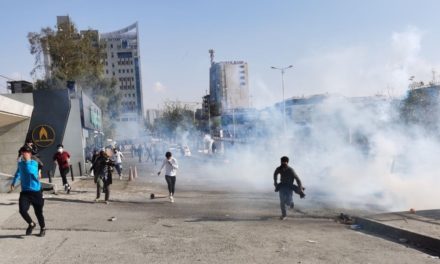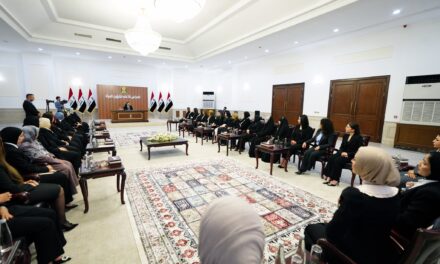It is understandable that many Iraqis are reluctant about feeling optimistic towards the future of their country. Hope before 2003 was nonexistent and could be dangerous, while after 2003, people’s hopes mostly consisted of expectations that the fall of Saddam’s regime would mean the direction of the country would move only upwards. However, the country faced difficult challenges from occupation and terrorism to ethnic and sectarian unrest that caused painful disappointment and loss of hope.
While Iraq is no longer under U.S. occupation, some claim that the presence of the coalition forces in Iraq is another form of occupation among all the other issues that are still present and plaguing the country.
Nevertheless, for the first time in many decades there is real hope for Iraq. Some have a problem with having hope. Activists and analysts who are optimistic about the future are often accused of ‘denialism’.
There are many justified reasons why Iraqis do not like optimistic statements. However, not all pessimism among Iraqis is natural. Iraq’s public opinion is laden with negativity. Lots of it is the result of the negative media coverage and bad rankings in terms of corruption and livability when it comes to Iraq, and it is difficult to believe that all that is driven by an innocent agenda.
Many of Iraq’s neighbors who feel threatened by a democratic system in the region push a negative narrative about the country. Iraq’s neighbors who are and never will be comfortable with its democracy use their media to point out its shortcomings in order to make Iraqis lose hope about the situation and push for changes in alignment with the agendas of these neighbors. By doing that, they are also discouraging their own people from pushing for change by distorting their views about democracy and claiming that it would lead to war and terror like in Iraq.
Domestic players also use harsh critiques against the government for political reasons, even if the critique and continued negativity would harm the state itself based on the Iraqi adage ‘either we play, or we destroy the playground’. Iraq’s victories, despite the incredible difficulty and numerous sacrifices to achieve them, become insignificant for those who consume what these outlets are producing.
All Iraqis have the right to a good and comfortable life. However, because of a perfectionistic tendency that is encouraged among Iraqis and used skillfully by many ‘unfriendly’ actors, many have started to adopt impossible expectations for Iraq that cannot be achieved in a short period of time. It is for instance unrealistic and even uninformed to compare life in Iraq with a Western liberal democracy. These countries, and the West in general, have had almost uninterrupted stability since WWII and have worked hard to achieve their current situation. Any comparison with these countries would certainly make Iraq look far off.
Nevertheless, the optimism about Iraq is not baseless. It is always good to have an optimistic outlook, but there are genuine indicators that the hope about Iraq’s future is realistic.
The first indicator is that regardless of Iraq’s current situation, Iraq had and still has a lot of potential. The potential lies in its natural resources that — at least in the medium-term —can finance its rebuilding process. The potential is in its geographic location that makes it an important trade route and a geopolitical power. Another potential is in its human capital. Iraq has many young and smart people who are resilient and eager to improve if they are given the chance. As long as there is potential, there is hope. What is required is somebody who is able to tap into that potential.
The second important indicator is that for the first time, there seems to be a direction the country is moving towards, and it is not downwards. Iraqis have finally started to plan for the future. In terms of economic indicators, there is progress. Iraq did not shy away from reforming important institutions like the military and the Popular Mobilization Forces. These came in sensitive times but in the long term will help Iraq avoid huge problems. There are clear signs that the sectarian narrative is weaker than before, tensions between Baghdad and Erbil are gradually easing and cultural life in Iraq is flourishing again. As a result, observers have an optimistic outlook, and investors are willing to do business in Iraq.
The third important indicator is that Iraq is showing leadership. Recent surveys show some healthy support for Iraq’s prime minister among Iraqis from different ethnic and religious backgrounds. This did not come from nothing and there are clear signs that he is doing several things right. Furthermore, citizens have started to trust important state institutions like the military again. This is also an indicator that leaders in these institutions are doing a good job in gaining the trust of the people. The religious authority in Najaf uses its influence to support democracy and reform. Most importantly however, the Iraqi people themselves have been showing leadership. Their resilience, bravery and solidarity broke the sectarian barriers, which enabled them to face the dark plots of ISIS.
All the pains of the Iraqi people are real, and the challenges they are facing are enormous. However, without realistic optimism, rebuilding and development is not possible. With only a few days left to national elections, this is definitely not the right time to lose hope in Iraq.

Muhammad Al-Waeli
Muhammad Al-Waeli is an Iraqi commentator on political and social issues. He is currently doing a PhD in Human Resource Management and is interested in politics, media, and development.










